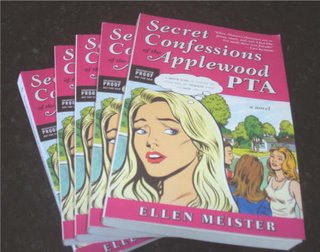Which side to believe?I was just talking yesterday with my dear pal
Susan Bono about the nature of essay writing, and how if you claim your experiences, as Anne Lamott suggests we all have the right to do, and write about, say, your boozy uncle with the lecherous fingers, so long as you tell the truth as you remember it and don't go out of your way to slander or libel ole pervy-phalanges, then in all fairness, he could write an essay about you, and what a Lolita you were, and how you purposely misinterpreted his slightest word and gesture with malice. There are two sides to every story, and each of us has a hazy filter.
So it's with more than a little empathy and reasonable doubt that I paste the content of this admittedly hilarious
Modern Love Essay from the New York Times. The essay is written by a spurned woman about a man I interviewed twice, and who will be the feature of a second article from
This Publication in April. I firmly believe that there are two valid, worthy sides to every essay, and so I don't believe for a minute that Xeni Fragakis, the author, is guileless, or that she fully revealed her own failings, but I confess, it's a hilarious essay. (Though I'd love to read his "rebuttal"). I'm even pasting it in its entirety here because I know most of you are just too busy to sign up for the free registration at the NYTimes.
A Girl Could Get Cornered in a Tiny HouseModern Love Essay
New York Times
By XENI FRAGAKIS
Published: March 5, 2006
A FEW years ago I embarked on an ill-advised romance. From the start I had significant reservations about the man: not the right reservations, it would turn out, but reservations nonetheless. For one, he held a part-time job at the local food co-op as a cheese cutter, and how long could I go without making a "Did you cut the cheese?" joke? Oh, not long. Not long at all.
He was also an adjunct assistant professor in the local university's art department, and, as everyone knows, there's no one in this world more bitter than an adjunct. In addition he lived in a house he had built himself.
There was nothing wrong with his living in a house he had built himself. What was wrong was that the house he had built was only big enough for him. It was 8 feet by 12 feet. It had wheels and would therefore be easy to flee town in.
To make matters worse, the tiny house had a name. And that name was Tumbleweed.
All this normally would have bothered me. But none of it did. Because, I'll admit it, I'm a sucker for a pretty face, and the Tiny House Man's face was very pretty, delicately featured yet masculine. Unfortunately it was bearded in the soul patch style, which can make any chin look vaguely pudendal, but that was nothing that a persuasive girlfriend and a lovingly applied coat of Nair couldn't eventually take care of.
So the Tiny House Man and I made plans for dinner, and we agreed to meet first at the tiny house, so that I might see how tiny it was. Once at the house, which was tiny indeed, I was greeted by the Tiny House Man. I saw that he was wearing Teva sandals. I hate Teva sandals. He opened a bottle of wine, and it was not long before I forgot that I hated Teva sandals.
THE Tiny House Man and I drank and laughed and drank some more and laughed some more and forgot completely about going to dinner. At one point he excused himself to go outside. (The tiny house was not equipped with a working toilet; its builder and owner was, it appeared, a big proponent of composting.)
While he relieved himself, I sat on the tiny floor of his tiny house and looked at his one bookshelf, which was stocked exclusively with books about tiny houses and a good number of tantric sex manuals.
When he returned from communing with or, in this particular instance, insulting nature, he sat by my side. Very close by my side. I wondered whether our proximity was a function of limited real estate or genuine romantic interest. But soon our shoulders touched. And then our hands. And then our lips.
The angels sang.
And then the angels all of a sudden stopped singing.
He pulled himself abruptly away.
"There's something I have to tell you," he said.
I wondered what this something might be: I have hepatitis C? I'm a preoperative transsexual?
Tumbleweed isn't up to code?
"I have a girlfriend, but she cheated on me, and I told her that I'd break up with her as soon as I met someone else."
I liked the idea of being someone's someone else. I didn't like the idea that that someone had a girlfriend.
"I'm flattered," I said. "But it might have been nice if you'd broken up with her before you asked me out on a date."
"This isn't a date," he said. "I don't know where you got the idea that this was a date."
Now, a person who was smarter, and not so hard up, would have left the tiny house as soon as she heard the word girlfriend. But I was not so smart, and quite hard up, and the Tiny House Man was saying such nice things to me during our nondate — how pretty I was, how intelligent, how witty — and I grew more and more smitten with each addition to the apparently endless catalog of my wonderfulness.
He said he wanted to see me again. I said I wanted to see him again, but what about his girlfriend? He said he didn't want to hurt his girlfriend, so he couldn't break up with her right now.
When was he planning to break up with her? I wondered. Next week? Next month? Next year?
"I don't know," he said. "Maybe never."
I had met the girlfriend at two or three parties we both had attended, though at the time I hadn't realized she was such.
I announced to the Tiny House Man that I could not date him under these circumstances. I could, however, meet him for dinner in two weeks. A platonic dinner, we both insisted.
FOR the second of our two nondates we met at my comparatively palatial apartment. Again we drank wine. Again we failed to make it to dinner. Again the angels sang. And this time they sang longer, more technically demanding, generally more satisfying songs than they had the first time.
Thus, it surprised me when the relationship ended, which it did about 10 minutes later.
The Tiny House Man said, "Maybe we could do this again."
"Maybe if you stop having a girlfriend, we could do this again," I said.
He let out a world-weary chuckle. "I don't think that's going to happen."
It appeared that the Tiny House Man didn't want a new girlfriend. He wanted two girlfriends.
I said, "I'm not some car that can be taken out for a test drive" (when what I really meant, of course, was "for yet another test drive").
He said: "Well, I'm sorry. That's all I can offer."
I can't say that I dealt well with the news.
"I feel so used," I wailed to my best friend, Peyton, and I felt a little disappointed in myself: couldn't I come up with something better than "I feel so used"?
To anyone who would listen I argued for my worthiness, enumerating all my good qualities: that
I was smart and funny, that I didn't cheat on my boyfriends (or hadn't recently).
"I don't know why he stays with that tramp," I declared to Peyton. "I mean, I'm better than she is. Aren't I? Aren't I?"
"Of course you are," she said, proffering the only right answer.
"Then why does the trampy girl get picked and I don't? It's not fair!"
"It's not fair": someone had failed to remind me that the moratorium on pouty declarations of "it's not fair" had been in effect since the day I turned 7. Instead I became convinced that the Tiny House Man needed to know how unfair it was. And then I became convinced that it was he himself who could explain the unfairness to me.
I dialed his number, and when he did not answer, I dialed his number again. And again. And again. And again.
On the one hand I knew that my behavior was obsessive. On the other hand I was prefacing a majority of the calls with *67, which, it was my understanding, caused a phone call to be purged from the space-time continuum, as if the call had never existed.
A few days later the Tiny House Man called and asked, "Why do you keep calling me?"
"I don't understand what you're talking about," I said.
"You keep calling me. The number comes up 'not available,' but I know it's you."
"How?" I said. "How do you know?"
"I know," he said, "because you called, like, five times, and I saw your number on caller ID. And then you called, like, five times, and there was no number on caller ID, and so I thought it was pretty safe to assume it was you."
"Well, I don't think it was pretty safe to assume," I said, even though I knew that, as assumptions went, it was about as safe as they got.
I was even about to admit as much when he said, "Look, this is all getting very 'Fatal Attraction,' " and I was so taken aback by the carting out of that cheesy misogynistic cliché that I hung up. I mean, couldn't he come up with something better than "This is all getting very 'Fatal Attraction' "?
A COUPLE of weeks later I was exiting the unfortunately named but tasty Whitey's Ice Cream when I came upon the Tiny House Man and his girlfriend. He said, "Hi," as if to assure his girlfriend that I was a mere acquaintance, but I refused to acknowledge either of them.
My head held high, I passed them, noting, with satisfaction, as I did, that they were neither holding hands nor standing particularly near each other. I thought about happiness, about how shared misery wasn't the same thing as intimacy.
I had yet to entertain the much more radical notion that perhaps they weren't miserable, that whatever their difficulties (and clearly they had them) there might be something there worth preserving, that relationships were complex, imperfect systems. And that people were imperfect, that you might not have to be perfect to be loved, that you could be loved in spite of your imperfections or sometimes even because of them.
Of course none of this had occurred to me, nor would it for a long time. And as I kept walking, my head tilting ever higher, the ache in my upper neck numbed only by my sense of superiority, it was this one thought that offered me any comfort, that lent my own tiny world some order: I look way hotter in my jeans than she does in hers.
 Here I am working on THE proposal!
Here I am working on THE proposal!
 North or South of San Francisco?
North or South of San Francisco? Good 'Ole P-Town
Good 'Ole P-Town







